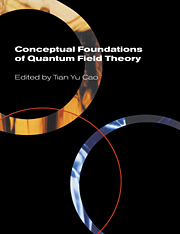Book contents
- Frontmatter
- Contents
- List of contributors
- Preface
- Photographs of the conference
- Introduction: Conceptual issues in quantum field theory
- Part One Philosophers' interest in quantum field theory
- Part Two Three approaches to the foundations of quantum field theory
- Part Three
- Part Four Mathematics, statistics and quantum field theory
- Part Five Quantum field theory and space-time
- Part Six
- Part Seven Renormalization group
- Part Eight Non-Abelian gauge theory
- Part Nine The ontology of particles or fields
- 22 The ineliminable classical face of quantum field theory
- 23 The logic of quanta
- 24 Do Feynman diagrams endorse a particle ontology? The roles of Feynman diagrams in S-matrix theory
- 25 On the ontology of QFT
- Part Ten
- Name index
- Subject index
23 - The logic of quanta
Published online by Cambridge University Press: 22 September 2009
- Frontmatter
- Contents
- List of contributors
- Preface
- Photographs of the conference
- Introduction: Conceptual issues in quantum field theory
- Part One Philosophers' interest in quantum field theory
- Part Two Three approaches to the foundations of quantum field theory
- Part Three
- Part Four Mathematics, statistics and quantum field theory
- Part Five Quantum field theory and space-time
- Part Six
- Part Seven Renormalization group
- Part Eight Non-Abelian gauge theory
- Part Nine The ontology of particles or fields
- 22 The ineliminable classical face of quantum field theory
- 23 The logic of quanta
- 24 Do Feynman diagrams endorse a particle ontology? The roles of Feynman diagrams in S-matrix theory
- 25 On the ontology of QFT
- Part Ten
- Name index
- Subject index
Summary
Are there quantum objects? What are they if they are neither given nor resemble anything familiar? To answer these questions we have to abstract from the substantive features of familiar things, delineate the pure logical forms by which we acknowledge objects and show how the forms are fulfilled in quantum theories. We have to explicate, in general terms and without resorting to the given, what we mean by objects. The clear criteria will enable us to affirm the objectivity of quantum theories.
Auyang 1995, p. 5Introduction
Cantor, famously, defined a set as ‘… collections into a whole of definite, distinct objects of our intuition or of our thought’ (Cantor 1955, p. 85, our emphasis). On this basis the standard formulations of set theory, and consequently much of contemporary mathematics, are erected. Reflecting upon this definition, and the underlying ontological presuppositions, the question immediately arises, how are we to treat, mathematically, collections of objects which are not distinct individuals? This question becomes particularly acute in the quantum mechanical context, of course. As Yu. I. Manin noted at the 1974 American Mathematical Society Congress on the Hilbert Problems,
We should consider possibilities of developing a totally new language to speak about infinity [that is, axioms for set theory]. Classical critics of Cantor (Brouwer et al.) argue that, say, the general choice is an illicit extrapolation of the finite case.
- Type
- Chapter
- Information
- Conceptual Foundations of Quantum Field Theory , pp. 324 - 342Publisher: Cambridge University PressPrint publication year: 1999
- 2
- Cited by



